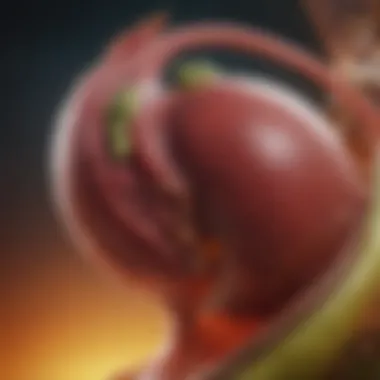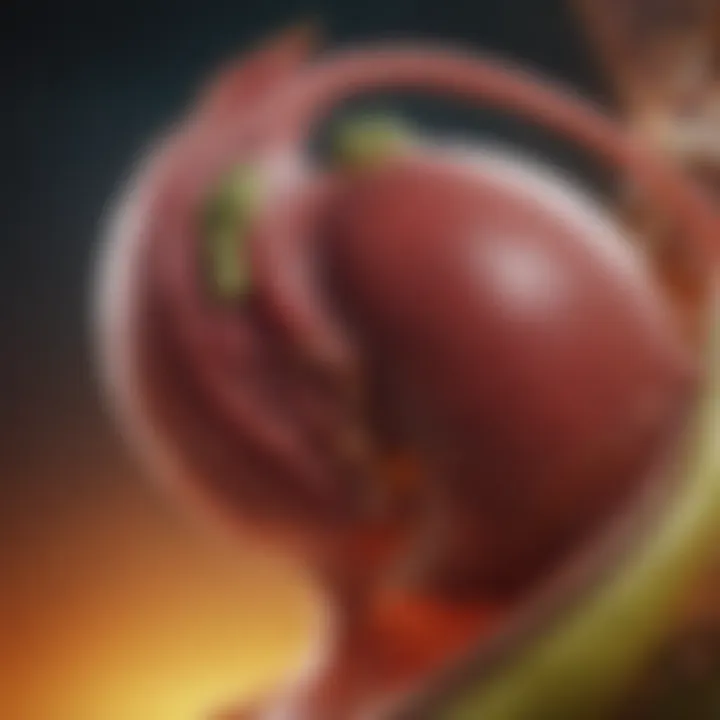Understanding Gallbladder Health and Weight Loss Strategies


Research Overview
Summary of Key Findings
The relationship between gallbladder function and weight loss is multi-faceted. It is clear that a well-functioning gallbladder plays a crucial role in the digestion of fats. The gallbladder stores bile produced by the liver, releasing it into the small intestine when needed. This process assists in emulsifying fats, which is essential for proper nutrient absorption. Dysfunction in gallbladder function, such as gallstones or cholecystitis, can negatively influence metabolism, leading to complications in weight management. Studies indicate that individuals with gallbladder dysfunction often face challenges in losing weight or maintaining a healthy weight.
Background and Context
Gallbladder health is an often-overlooked aspect of overall wellness. Many people may not be aware of how essential this organ is for metabolizing dietary fats. The Western diet, high in saturated fats, can lead to an increased risk of gallstones and other issues related to gallbladder function. Moreover, understanding the correlation between diet, lifestyle choices, and gallbladder health is imperative for effective weight management. There is a growing acknowledgment that interventions that promote gallbladder health can enhance weight loss efforts.
Methodology
Experimental Design
Research into gallbladder function and its impact on weight loss typically employs observational and interventional study designs. Longitudinal studies allow researchers to observe changes in weight and gallbladder health over time, correlating dietary habits with metabolic outcomes. Experimental designs often involve specific dietary interventions aimed at improving gallbladder health and assessing their effects on weight loss.
Data Collection Techniques
Data is collected through a variety of means, including:
- Surveys and Questionnaires: Gathering information on dietary habits and lifestyle choices from participants.
- Medical Evaluations: Conducting ultrasound examinations to assess gallbladder function and identify any dysfunction present.
- Clinical Trials: Involving participants in controlled dietary interventions to record changes in weight and gallbladder health.
Research indicates that lifestyle modifications, like increasing physical activity and adopting a balanced diet, can positively influence gallbladder health.
Maintaining a healthy gallbladder is key to effective weight loss, as it directly influences fat digestion and absorption.
Aspects of dietary strategies that support gallbladder function include:
- Consuming healthy fats, like those from avocados and nuts.
- Eating plenty of fiber, which helps support digestion.
- Staying hydrated to facilitate metabolic processes.
The integration of these findings into practical advice can empower individuals to make informed choices that promote both gallbladder health and weight loss effectiveness.
Intro
The exploration of gallbladder function and its relation to weight loss reveals important aspects of human health. The gallbladder is often overlooked in discussions about metabolism and weight management, yet it plays a pivotal role in digestion and fat absorption. Understanding this organ can lead to more effective weight loss strategies.
Research shows that good gallbladder health is linked to better metabolism. When the gallbladder is functioning properly, it stores bile produced by the liver. This bile is essential for breaking down fats during digestion. If the gallbladder is not functioning at its best, it can lead to digestive issues and affect how the body processes food.
A critical understanding of gallbladder health can help in identifying possible weight issues. Dysfunction can slow down metabolism and hinder weight loss efforts. Therefore, examining dietary choices and lifestyle strategies directly affects gallbladder function and, by extension, weight management.
In this article, we will delve into various elements about the gallbladder, including its anatomy, common disorders, and dietary influences. With a detailed look into each aspect, we aim to provide substantial insights that can benefit individuals striving for better health and professionals enhancing their knowledge about metabolic processes.
Gallbladder Anatomy and Function
Understanding the anatomy and function of the gallbladder is essential when exploring its relationship with weight management. This organ plays a critical role in digestion by storing bile produced by the liver. The gallbladder not only contributes to fat metabolism but also has implications on overall health. Therefore, the details of its location, structure, and roles in digestion and interaction with the liver are paramount.
Location and Structure
The gallbladder is a small, pear-shaped organ located beneath the liver. It is about three to four inches long and can hold approximately 30 to 50 milliliters of bile. Its primary function is to store and concentrate bile, a digestive fluid made up of water, electrolytes, and bile salts. The gallbladder is connected to the hepatic duct, which transports bile from the liver, and the cystic duct, which leads to the common bile duct. This arrangement allows the gallbladder to release bile into the small intestine when needed. Its structural design enables it to efficiently store bile until it is required for digestion.
Role in Digestion
During digestion, especially after the consumption of fatty foods, the gallbladder contracts and releases bile into the duodenum. Bile emulsifies fats, rendering them easier to digest and absorb. This process is crucial for the effective utilization of fat-soluble vitamins such as A, D, E, and K. When the gallbladder is functioning well, it enhances the overall efficiency of digestion and nutrient absorption. Disorders affecting gallbladder function can lead to issues such as improper fat digestion, resulting in symptoms such as bloating, diarrhea, and nutrient malabsorption.
Interaction with the Liver
The gallbladder has a symbiotic relationship with the liver. The liver produces bile, which contains bile acids required for fat digestion. Once produced, bile is transported to the gallbladder for storage. When food enters the small intestine, a hormone called cholecystokinin is released, prompting the gallbladder to contract and release bile into the digestive tract. This interaction is vital to maintain an effective digestive system, as the release of bile is contingent upon proper liver function. Any impairment in liver health can subsequently affect gallbladder functionality and, by extension, digestion and nutrient absorption.
Understanding the gallbladder's anatomy and function informs its impact on overall health, particularly in relation to weight management. A well-functioning gallbladder aids digestive efficiency, which is essential for maintaining a healthy weight.
Through a thorough understanding of these anatomical and functional aspects, one can appreciate the pivotal role the gallbladder plays in digestion and weight management. Maintaining gallbladder health is therefore essential for individuals seeking effective weight loss strategies.


Gallbladder Disorders
Gallbladder disorders play a significant role in understanding the intricate relationship between gallbladder health and weight loss. These conditions can impact how our bodies process fats and absorb nutrients. The gallbladder's main function is to store and concentrate bile, which is essential for digestion. When this organ encounters problems, it may disrupt digestion, absorption, and, ultimately, affect weight management.
Common Gallbladder Issues
Several conditions can affect the gallbladder. The most frequent disorders include:
- Gallstones: Solid particles that form from bile components. They can be small or large and may cause pain or discomfort.
- Cholecystitis: Inflammation of the gallbladder, often triggered by gallstones or infection.
- Biliary Dyskinesia: A condition where the gallbladder does not contract effectively, leading to poor bile release.
Understanding these issues is important. Gallstones can block the bile ducts, leading to complications in digestion. Cholecystitis can cause severe abdominal pain and limit dietary choices, which may hinder weight loss efforts.
Impact of Gallstones
Gallstones are perhaps the most well-known gallbladder disorder. They develop when the balance of substances that make up bile is disrupted. Factors such as obesity, rapid weight loss, or a high-fat diet can heighten the risk of gallstones.
The presence of gallstones may lead to:
- Pain: Frequent episodes of severe pain in the upper abdomen, especially after eating fatty meals.
- Nausea and Vomiting: Common symptoms associated with gallstone attacks.
- Digestive Complications: Difficulty digesting fat, which could lead to unintentional weight loss or malnutrition.
Cholecystitis and Its Consequences
Cholecystitis refers to the inflammation of the gallbladder, typically due to blocked bile ducts by gallstones. It can also occur from infection or other diseases. Symptoms include intense pain, especially in the upper right abdomen, tenderness, and fever.
Consequences of untreated cholecystitis can be serious:
- Infection Risk: If bacteria multiply in stagnant bile, it can lead to severe infections.
- Perforation: A ruptured gallbladder can lead to peritonitis, a life-threatening condition.
- Impact on Weight Management: The discomfort can lead to avoidance of certain foods, impacting overall nutrition and weight.
"Cholecystitis can derail the body's ability to manage dietary fats efficiently, which in turn affects weight control and health."
In summary, being aware of gallbladder disorders is crucial. These issues not only influence digestion but also can have a direct effect on weight management strategies. Knowledge about these conditions can help individuals make better health decisions.
Metabolism and Weight Management
Metabolism plays a crucial role in weight management. Understanding how our body transforms food into energy enhances our awareness of effective weight loss strategies. The gallbladder, as part of the digestive system, influences metabolism significantly. When discussing gallbladder function and weight loss, it is essential to recognize the interplay between these two aspects.
Several vital elements emerge when considering this relationship:
- Digestive Efficiency: The gallbladder stores bile, which is critical for fat digestion. A well-functioning gallbladder ensures better absorption of nutrients, aiding metabolic processes.
- Hormonal Balance: Metabolism is regulated by hormones, many of which are influenced by our dietary choices. The gallbladder affects hormonal responses that control hunger and fat storage.
- Energy Utilization: Efficient metabolism translates into energy expenditure. An optimally functioning gallbladder supports appropriate energy release from digested fats, contributing to a healthy weight.
Ultimately, when the gallbladder is healthy, it aids in maintaining a balance that is conducive to effective weight management.
How Gallbladder Function Affects Metabolism
Gallbladder function has direct implications for our metabolic rate. Among its roles, it regulates the timing and release of bile into the small intestine. This release is particularly intense when dietary fats are consumed. Inadequate bile concentration can lead to poor fat digestion. This inefficiency results in undigested fats entering the bloodstream, which can lead to weight gain and nutrient deficiencies.
In addition, a dysfunctional gallbladder may cause bile salts to be released improperly. This disruption impacts the metabolism of fats and vitamins, requiring the body to work harder to obtain the needed energy. Critical vitamins, such as A, D, E, and K, rely on fat for absorption. Poor gallbladder health can inhibit proper uptake, leading to potential deficiencies in these essential nutrients.
Energy Expenditure and Body Composition
Energy expenditure relates closely to how calories are burned throughout the day, impacting body composition. The gallbladder, by facilitating proper fat digestion, affects these figures significantly. For individuals attempting to lose weight, optimizing energy expenditure is crucial. An efficient gallbladder aids in effective fat breakdown, allowing the body to use fat as energy during workouts or daily activities.
Moreover, body composition refers to the ratio of fat to lean tissue. A healthy gallbladder contributes to a better balance of fat and muscle in the body. Conversely, if gallbladder function is impaired, it can lead to a buildup of fat storage and hinder muscle preservation.
In summary, the metabolism and weight management relationship hinges on the gallbladder's ability to function properly. Recognizing these dynamics can guide individuals in making informed choices about their diets and overall health.
Understanding the role of the gallbladder in metabolism provides clarity on weight management. Better dietary and lifestyle choices can lead to enhanced gallbladder health and effective weight loss strategies.
Dietary Considerations for Gallbladder Health
Understanding dietary considerations for gallbladder health is essential for both optimal function and weight management. The gallbladder plays a key role in storing and releasing bile, which is necessary for digesting fats. Proper nutrition can support its function, helping to prevent disorders such as gallstones or cholecystitis. A diet tailored for gallbladder health not only aids in digestion but may also have a significant impact on metabolism, making it a critical focus for anyone interested in overall wellness and effective weight loss strategies.


Foods that Support Gallbladder Function
Certain foods can enhance gallbladder function. Incorporating these into your diet may contribute to better health:
- Leafy Greens: Spinach, kale, and other greens are high in antioxidants and can promote liver health, aiding gallbladder function.
- Healthy Fats: Sources such as avocados, olive oil, and fatty fish (like salmon) provide essential fatty acids that help the gallbladder release bile properly.
- Fruits: Berries, apples, and citrus fruits are rich in fiber and vitamins, supporting both gallbladder and overall digestive health.
- Whole Grains: Foods like brown rice, quinoa, and oatmeal contain fiber that aids digestion and prevents bile-related issues.
Including these foods can help ensure that bile production remains efficient, thus supporting fat digestion and absorption.
Foods to Avoid for Gallbladder Health
Conversely, some foods can negatively impact gallbladder health. It is advisable to limit or avoid:
- Refined Carbohydrates: White bread, pastries, and sugary snacks can lead to bile acid imbalances.
- Trans Fats: Find in fried foods and many processed snacks, trans fats can increase the risk of gallbladder diseases.
- High-Fat Dairy Products: Full-fat cheese, butter, and cream can place excess strain on the gallbladder.
- Red and Processed Meats: High in saturated fats, these meats can contribute to gallstone formation.
Avoiding these foods can help maintain gallbladder health and prevent complications that may arise from its dysfunction.
The Role of Fiber in Weight Management
Fiber plays an important role in weight management, particularly for those concerned with gallbladder health. It helps regulate digestion and can contribute to a feeling of fullness, thus reducing overall caloric intake. High-fiber diets have been linked to lower cholesterol levels, which supports gallbladder function by preventing the formation of gallstones. Foods high in fiber, such as vegetables, fruits, and whole grains, should be regularly included in one's diet. This focus not only aids weight loss but also promotes lasting gallbladder health.
"A diet rich in fiber can enhance not only digestion but also overall metabolic health. Understanding its benefits is key to effective weight management."
Lifestyle Modifications for Weight Loss
Lifestyle modifications play a crucial role in effective weight loss strategies, especially when considering gallbladder function. The gallbladder is essential in fat digestion, thus influencing how the body utilizes energy. By implementing targeted lifestyle changes, individuals can optimize their gallbladder health and manage their weight effectively.
Such modifications typically include a combination of dietary adjustments, increased physical activity, and stress management techniques. Each of these elements contributes towards improving gallbladder function, boosting metabolism, and promoting overall health. Achieving sustainable weight loss requires not only understanding these elements but also the integration of them into daily life.
Importance of Physical Activity
Physical activity is paramount for maintaining optimal gallbladder health and supporting weight loss. Engaging regularly in exercise helps improve the metabolic rate. This leads to more efficient energy use within the body. With a functioning gallbladder, the body can properly digest fats, preventing excessive fat accumulation.
Studies show that individuals who incorporate aerobic exercises, such as walking, swimming, or cycling, tend to have healthier gallbladder function. Strength training exercises are also significant because they enhance muscle mass, which in turn elevates resting metabolic rate.
Incorporating physical activity into daily routines does not need to be overwhelming. Finding enjoyable activities is essential. Whether it is joining a sports club or practicing yoga, consistency is more critical than intensity. Even small measures, like taking the stairs instead of the elevator, can contribute positively.
Stress Management Techniques
Stress can have a deleterious effect on gallbladder function and overall health. Chronic stress is linked to altered eating habits, such as increased consumption of unhealthy foods, which can exacerbate gallbladder issues and undermine weight loss efforts. Therefore, managing stress effectively is vital.
Several stress management techniques can be advantageous. Mindfulness practices, such as meditation and deep-breathing exercises, help in cultivating mental clarity and emotional stability. Moreover, engaging in hobbies and spending time in nature can also reduce stress levels.
Additionally, maintaining a balanced social life can provide emotional support and reduce feelings of isolation. Building strong relationships contributes positively to mental health and can lead to healthier lifestyle choices overall.
"Understanding and addressing stress is key to maintaining a healthy gallbladder and achieving weight loss goals."
Impact of Gallbladder Removal on Weight Loss
The impact of gallbladder removal, known as cholecystectomy, on weight loss is a topic of importance in understanding how such a surgical procedure affects an individual’s metabolism and nutritional balance. This section examines both the physiological aspects and the practical implications of living without a gallbladder. It is essential to consider how this surgery can influence weight management strategies and the necessary adaptations in dietary and lifestyle habits that may ensue.
Understanding Cholecystectomy
Cholecystectomy is a surgical procedure where the gallbladder is removed, typically due to issues such as gallstones or cholecystitis. The gallbladder plays a significant role in digestion by storing and concentrating bile produced by the liver. Bile is critical for breaking down fats in our diet. When the gallbladder is removed, bile flows directly from the liver to the small intestine, albeit in a less concentrated form.
This change can lead to altered digestion, particularly concerning the consumption of dietary fats. While some individuals might not notice substantial changes post-surgery, others may experience digestive discomfort or alterations in fat absorption.
Key Considerations:
- Digestive Adaptation: Adjusting to the absence of the gallbladder requires time as the body adapts to continuous bile flow.
- Nutritional Monitoring: Post-surgery, patients should pay attention to their dietary choices to avoid potential digestive issues, especially with high-fat foods.
Weight Changes Post-Surgery


After a cholecystectomy, patients may experience changes in weight, which can be varied and depend on several factors. Some individuals may notice weight loss shortly after the procedure, while others could experience weight gain in the long term due to changes in metabolism and dietary habits.
"Weight changes can vary greatly among individuals after gallbladder removal, with some losing weight initially and others eventually gaining."
Common Patterns:
- Initial Weight Loss: This can occur as individuals adapt to new eating habits or due to complications like extended recovery periods leading to less physical activity.
- Later Weight Gain: Some individuals may find they gain weight due to changes in how their body processes fats, leading potentially to a higher caloric intake if they do not modify their diet accordingly.
Implications for Weight Management:
- Dietary Adjustments: Post-surgery, it can be beneficial to adopt a diet lower in fat while gradually reintroducing healthy fats.
- Monitoring Biometrics: Keeping track of weight and metabolic health can help in preventing unwanted weight gain in the long run.
Research Insights on Gallbladder and Weight Loss
Understanding the relationship between gallbladder health and weight loss is crucial. This section will explore the latest findings from research, shedding light on the intricate dynamics at play. Research on gallbladder function and its effects on metabolism can inform strategies for effective weight management. Moreover, insights gained from this research contribute to a holistic view of health, emphasizing the need for further exploration within this domain.
Latest Studies on Gallbladder Function
Recent studies have aimed to clarify the role of the gallbladder in digestion and metabolism. Researchers have focused on how gallbladder dysfunction can lead to metabolic disturbances. For instance, some research indicates that an inefficient gallbladder may not properly release bile during digestion. This inefficiency can cause fat malabsorption, resulting in issues like weight gain or difficulty losing weight.
Furthermore, new findings suggest that maintaining gallbladder health may be linked to better metabolic outcomes. One study highlighted that individuals with normal gallbladder function have a more stable metabolic rate. Additionally, the gallbladder's ability to store and concentrate bile plays a vital part in the digestion of fats. Enhanced bile flow can improve the metabolic processing of lipids, potentially aiding weight management.
Obesity and Gallbladder Health Correlation
A significant body of research has delved into the correlation between obesity and gallbladder health. Studies suggest that obesity can lead to an increased risk of gallstones. These are hardened deposits that can obstruct bile flow and lead to gallbladder disease. The implications of this are serious, as gallbladder issues can further complicate weight loss efforts.
Moreover, individuals with obesity may experience alterations in gallbladder motility. This refers to the gallbladder's ability to contract and release bile. Poor motility can lead to a reduced ability to digest fats effectively.
"Understanding the interconnectedness of obesity and gallbladder health paves the way for targeted interventions that may improve outcomes for affected individuals."
In light of these findings, it becomes apparent that maintaining optimal gallbladder function is essential not just for digestion but also for supporting weight management efforts. As such, discussing these concepts is critical for professionals and individuals interested in the nexus between gallbladder health and weight loss.
Common Misconceptions
Misunderstandings surrounding gallbladder health and its removal often create unnecessary worry and affect health choices. Addressing these misconceptions is crucial for informed decisions regarding gallbladder function and weight management. Providing clarity on these topics can direct individuals towards healthier lifestyles and better management of their wellbeing. By confronting these myths, we can advance discussions rooted in evidence and improve public knowledge.
Debunking Myths about Gallbladder Removal
Many believe that gallbladder removal, or cholecystectomy, leads to drastic changes in digestion and weight gain. However, this is not universally true. The gallbladder stores bile, which helps in digesting fats, but other organs, especially the liver, can compensate for this loss.
Here are a few common myths about gallbladder removal:
- Myth 1: You cannot digest fats after gallbladder removal.
Fact: The liver continues to produce bile that flows directly into the intestines. - Myth 2: Weight gain is inevitable post-surgery.
Fact: Weight changes depend more on diet and lifestyle rather than the absence of the gallbladder. - Myth 3: You will suffer from digestive issues indefinitely.
Fact: Many individuals adapt well within a short period after surgery.
These facts highlight the adaptability of the digestive system and the importance of a balanced diet.
Gallbladder Function Post-Surgery
After gallbladder removal, individuals may notice some adjustments in digestion. Nonetheless, most adapt quickly and successfully. The primary area of focus should be on dietary choices.
- Initial Recovery:
In the first weeks following the surgery, a low-fat diet is advised. This allows the digestive system to adjust gradually. - Long-Term Adaptations:
- Possible Digestive Changes:
- The body can adapt to the absence of the gallbladder.
- Healthy fats can still be consumed over time but in moderation.
- Some may experience diarrhea or bloating immediately after surgery.
- These symptoms generally improve within a few months as the body adjusts.
With awareness and proper management of their eating habits, individuals can lead healthy lives after gallbladder removal. Although the absence of the gallbladder changes digestion dynamics slightly, it does not preclude successful weight management or overall health.
End
The conclusion serves as a critical component of this article. It brings together the various threads explored throughout the sections, emphasizing the relevance of gallbladder health in the broader context of weight management. Given the importance of this organ in digestion and metabolism, its functioning—or dysfunction—can greatly influence body weight. Readers must grasp how gallbladder health is intricately linked to dietary choices and lifestyle modifications.
Summarizing the key insights highlights the significance of maintaining gallbladder health to support effective weight loss strategies. This article provides actionable recommendations that can assist individuals in achieving their health goals. It drives home the point that understanding one’s biological mechanisms contributes to informed decision-making in personal health management.
Considering future directions for research is vital as well. Continued investigation into the interplay between gallbladder function and metabolic processes can yield new findings that enhance our understanding and treatment of related disorders. As research advances, it will be essential to monitor how clinical observations can inform dietary guidelines and lifestyle recommendations for optimal gallbladder health.
"An informed approach to gallbladder health can lead to significant improvements in weight management, making it essential for both individuals and healthcare professionals to stay updated on this topic."
In summary, the conclusion effectively encapsulates the essence of this article. With a focus on gallbladder function and its implications for weight management, it urges readers to appreciate the integral role this organ plays in their health journey. As we move forward, a deeper understanding will promote better health outcomes.







